- Researchers have developed an AI system that can interpret neural signals, essentially reading thoughts in real-time.
- This technology expands the boundaries of neuroscience, offering insights into cognitive processes previously obscured.
- Potential applications include creating communication devices for individuals with speech impairments and paralysis.
- The AI uses advanced machine learning to translate brain activity patterns into comprehensible language.
- The system processes a massive 300 terabytes of neural data daily, a testament to its analytical prowess.
- The AI learns to recognize individual neural signatures, akin to mastering dialects of an ancient language.
- Ethical concerns arise around privacy, consent, and the potential for misuse of thought-reading capabilities.
- A balance between innovation and ethical integrity is crucial as this technology develops.
- The integration of AI and human cognition poses questions about the future of human interaction and societal benefit.
Our world teeters on the edge of a revolutionary breakthrough, one that melds the enigmatic complexity of the human mind with the relentless precision of artificial intelligence. Scientists from leading global research institutions have developed a groundbreaking AI system capable of deciphering neural signals, effectively interpreting thoughts as they occur.
Imagine a scenario where our thoughts are no longer held captive within the confines of our minds. With this technology, the frontier of neuroscience has expanded beyond traditional boundaries, offering glimpses into the inner workings of cognitive processes that were once shrouded in mystery. The implications are profound: unlocking this potential could lead to the development of sophisticated communication devices for individuals with paralysis and other conditions that impair speech.
This audacious endeavor employs advanced machine learning algorithms to analyze patterns in brain activity, translating these biological signals into comprehensible language. The AI system processes an astonishing 300 terabytes of neural data daily, akin to deciphering the encrypted hieroglyphs of the mind.
The neural symphony produced by our brains presents a unique challenge; each mind creates its own linguistic landscape. However, this innovative AI adapts dynamically, learning to recognize individual neural signatures much like mastering a new dialect of an ancient language. Researchers liken it to capturing the mind’s whispers and transforming them into harmonious dialogue.
In a world where the line between man and machine blurs evermore, ethical considerations cast long shadows. Concerns about privacy loom large as the capability to read thoughts raises questions about consent and control. Regulatory frameworks must evolve in tandem with technological prowess to ensure these developments serve humanity rather than infringe upon it.
The path forward requires a delicate balance between innovation and caution. As this AI’s capabilities continue to unfurl, societal perspectives must adapt to the possibilities that emerge. The message judiciously echoes through research corridors: while the pursuit of knowledge is relentless, it must be intertwined with ethical integrity and societal benefit.
As we stand on the cusp of a new era where AI unlocks the mysteries of the mind, the potential to redefine human interaction is within reach. This technological symphony beckons us to listen—to the science, to the ethical implications, and to the echo of an increasingly interconnected future. How we choose to harness this power remains one of the defining questions of our time.
This AI Can Read Your Mind: The Future of Human-Machine Interaction
The advancing capabilities of artificial intelligence to decode neural signals holds immensely promising yet ethically challenging implications. As AI systems can now interpret thoughts in real-time, it signals a revolutionary shift in neuroscience, communication, and the interface between humans and machines.
Neural Signal Decoding: A Technological Leap Forward
Neural signal decoding represents a significant leap in both AI and neuroscience. This groundbreaking AI system processes an unprecedented amount of neural data—300 terabytes daily—which pushes the boundaries of data processing and machine learning. This technology could profoundly shift how we approach medical communication devices, particularly for individuals who cannot communicate verbally due to paralysis, ALS, or other disorders.
How It Works
The AI employs machine learning algorithms capable of identifying and learning individual neural patterns. This learning is akin to mastering a unique dialect, as each person’s brain activity varies significantly. By translating these patterns into comprehensible language, the AI can potentially enable non-verbal communication for those otherwise silent.
The Wider Implications and Controversies
While the technical prowess is remarkable, the practical and ethical considerations are vast:
Privacy Concerns
The potential to translate thoughts bringing questions about privacy and consent to the forefront. With the ability to access and interpret personal mental processes, frameworks must be established to protect individuals’ rights and maintain the sanctity of private thought.
Regulatory and Ethical Frameworks
As with any major technological advancement, regulation is essential. Policies ensuring user consent and data security must precede widespread adoption. Ethical discussions must guide the development to prevent misuse and protect human rights.
Real-World Applications
Aside from personalized communication devices, this technology could impact multiple fields:
1. Healthcare: Enhanced communication tools for those with neuromuscular diseases.
2. Education: Custom learning experiences based on real-time cognitive processing.
3. Psychology and Counseling: New methods in understanding and treating mental health conditions through direct neural feedback.
Market Forecast and Industry Trends
As AI neural decoding continues to evolve, market growth in sectors like healthcare tech is anticipated. According to market research, demand for advanced brain-computer interface (BCI) systems is expected to rise sharply over the next decade, spurred by increased investment in AI research and development.
Actionable Insights
For Innovators:
– Prioritize ethical considerations in AI development.
– Foster transparent discussions about neural data use.
For Policy Makers:
– Accelerate the development of regulations balancing human rights with technological advancements.
– Engage cross-disciplinary panels to assess societal impacts.
Conclusion
As AI systems capable of reading minds become a reality, the balance between innovation and ethical responsibility is crucial. By addressing privacy, regulatory, and social implications proactively, we can ensure that this powerful technology is harnessed for the greater good.
For more information on the latest advancements in AI and technology trends, visit Wired.







